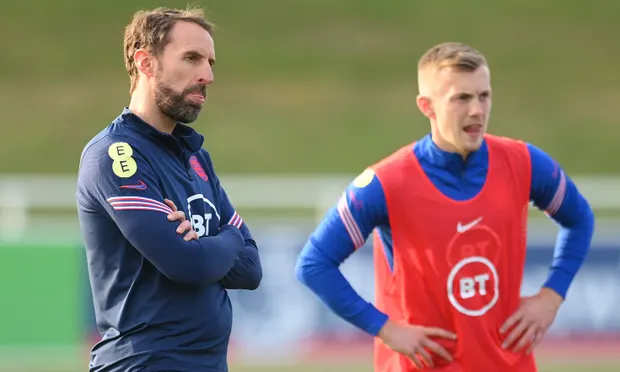There is nothing obscure about the threat posed by Ivory Coast but their visit to Wembley still feels curiously like a break from routine. England have not faced an opponent from outside Europe since November 2018, when the USA were seen off in a friendly; this will be the first and last chance to give preparations for Qatar 2022 a cross-continental flavour.
In the seven months leading up to the last World Cup England were able to face Brazil and then, once the draw was known, schedule friendlies in early June against Nigeria and Costa Rica. The theory is traditionally that it pays to test oneself against opposition who are proximate, geographically at least, to forthcoming group stage foes but that is far more difficult now.
After Tuesday night, England will play Germany, Hungary and Italy twice each in the Nations League before travelling to Qatar, but will have no time for further experiments; those fixtures might be at least semi-competitive but none of them are likely to bear surprises.
Then again, would any encounter do that? Gareth Southgate was asked whether it really matters that England will not be able to take on more unusual assignments between now and November, and whether the idea of distinct regional styles is outmoded given the level of cross-pollination and scrutiny throughout all corners of the sport.
“I think a lot of European football is homogenised but I don’t think world football is yet,” he said. “There are tactical criteria that transfer across but there are definite attributes, traits and styles that do have cultural differences: South American football with the way it’s played, African football.”
By that logic England may wish to avoid Saudi Arabia, Iran and Ecuador in November. Southgate believes the Covid-19 pandemic reduced his chances to experiment but also noted that globetrotting has not been on the agenda for most of their likely rivals. The key will lie in finding ways to mitigate any element of surprise.
“In an ideal world we’d have exposed our players to more of that [variety],” he said. “We’ve always wanted to do it, at junior level as well. But we’ve missed that opportunity. When I talk to coaches from South America they’re regretting not having that opportunity as well. It’s been a factor in the last couple of years, with the difficulties we have all faced. It’s not what we would like but we’re in no worse a position than anyone else. It will be the teams that adapt best that succeed.”
At the Africa Cup of Nations, Ivory Coast were sometimes attacking to the point of being gung-ho but were undone when they failed to break Egypt down, being picked off on penalties in the round of 16 and exiting at a stage that did not befit their threat. As it happens, spot-kicks are an issue to which Southgate can devote time more fruitfully than devising England’s schedule and, since they met up last week, improving their conversion rate has been a significant focus. Harry Kane’s winner against Switzerland came via a penalty, but the Euro 2020 final showed the pitfalls of having inexperienced takers to hand.
Southgate said this month’s camp has seen increased concentration on “where we can improve to be world champions” and identified penalties as a factor. “In terms of regular penalty takers for their club, we really only have Harry Kane and James Ward-Prowse,” he said. “[Marcus] Rashford would have been the second-highest in number, but Bruno Fernandes is [Manchester United’s] normal penalty taker.
“When we played Italy, their top five had taken more than 40 penalties in competitive matches. Kane is at that level and Marcus is next at 20. So we will have to view that differently than just accept ‘they’re going to get practice at their clubs and they will be able to come in.’ That is the challenge we have set with some individual work. We think it is the right thing to do.”
He would go no further regarding the specifics of any penalty homework, suggesting many in-house matters are “intellectual property” and “there was too much that didn’t come from football departments that came out about things that happened in Russia”.
The slightest change of plan, even the rejigging of a penalty order, can be costly he said. “There are some specifics of working, and the edge you’re looking to gain as a team, and we’d be foolish to give that to opponents or externally.”
Given Kane may not start against Ivory Coast, the identity of any penalty taker against the Elephants may be instructive. So would the overall performance against Patrice Beaumelle’s side, who were only downed in added time by France on Friday after taking the lead through Nicolas Pépé. Mercurial at club level, Pépé tends to come alive for his country: factors like that are among the many that make international football less predictable than a glance down a squad list might seem.
England are taking steps to reduce any reliance on chance. The match on Tuesday may come to look particularly useful once the draw has been made but, after that, much more may hinge on the work that takes place behind closed doors.
Source: The Guardian


